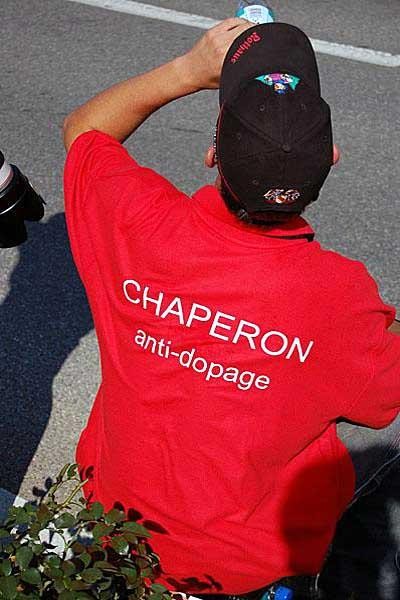UCI responds to Tour of California anti-doping complaints
By Kirsten Robbins in Santa Clarita, California The International Cycling Union's Anti-Doping Agency...

By Kirsten Robbins in Santa Clarita, California
The International Cycling Union's Anti-Doping Agency has reacted after receiving word of a complaint from Quick Step rider Kevin Hulsmans, after a female anti-doping chaperone followed the rider onto the team bus. According to Hulsmans, the female chaperone was politely asked to wait outside while he changed into dry clothing and his seven team-mates finished their post-race showers, however she refused to leave the bus.
According to the UCI Anti-Doping Agency's inspector Pierre Blanchard, the agency's usual protocol is to have gender-specific chaperones at all times, except for unusual cases. According to Blanchard the reason there was a female chaperone during the Stage 4 post-race anti-doping protocols in San Luis Obispo was due to a shortage of male volunteers available to act as chaperone. Because there has been an extreme amount of testing conducted at the event, it resulted in a large demand for volunteers to take on chaperone duty.
"We don't have enough male chaperones to cover all of the tests we need to conduct because we are conducting more tests here at the Tour of California than what is required," said Blanchard. Furthermore, Blanchard acknowledged that the UCI Anti-Doping Agency adjusted the protocol to allow riders being chaperoned to go back to their team bus to get dry clothes where they would normally have to report directly to the anti-doping tent.
"It was a very special circumstance because of the cold and the situation of the race conditions," said Blanchard. "Yes, the female chaperone had to go on to the team bus, but that would not normally happen. They would normally go directly to the tent, but because of the extreme weather we didn't want the rider to freeze and that is why, we had to be imaginative and that is why asked the teams to be imaginative and respectful."
While Blanchard admitted that the gender-specific protocol needs to be polished to handle large amounts of anti-doping tests, extreme weather and shortage of volunteers, there also needs to be a mutual respect between the chaperone and the teams of the rider under testing. "The regulation does not specify this, but as a general rule we always have to have mutual respect from everyone involved," said Blanchard. "We have to follow the rules with respect and sometimes need to adjust to the situation when we have a chaperone that is female with male rider and visa versa also."
The contract of the chaperone, signed by the volunteers on the day of the event, describes a number of duties. One of them is that the observer is expected to remain at a respectable distance from the rider, acting only as an observer. The contract further states, "you must always remain in visual contact. If he goes onto the team bus, you must accompany him. At no time are you to be excluded from remaining in the riders presence, it is your duty to have the rider under observation at all times".
The latest race content, interviews, features, reviews and expert buying guides, direct to your inbox!
According to Blanchard, the Anti-Doping Agency had a positive discussion with the Quick Step team, along with other teams, to inform all parties that there is a shortage of male volunteers and that female chaperones will be utilized to ensure the quality and credibility of the anti-doping protocol. "We discussed that if this ever happens again that we can find a mutual solution and I think everyone understood," said Blanchard. "Obviously, right at the moment there were misunderstandings."